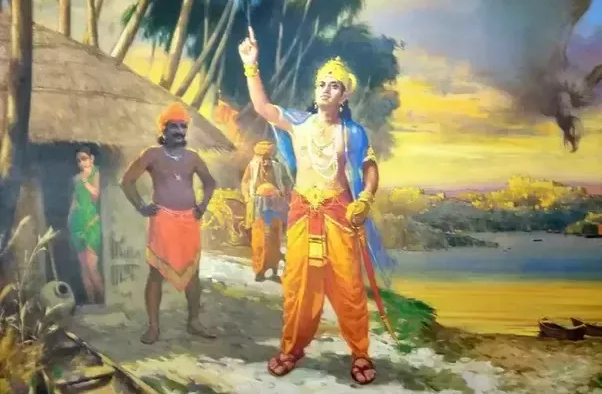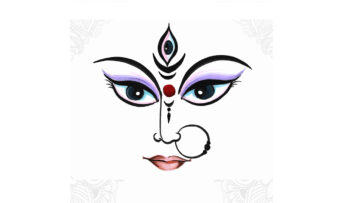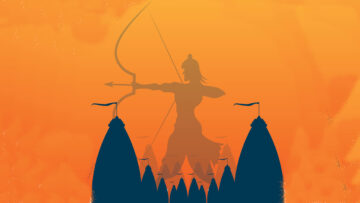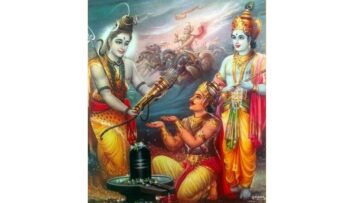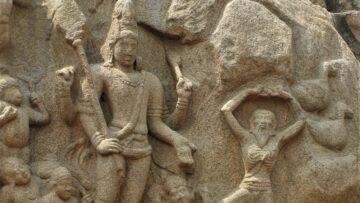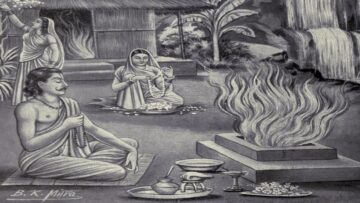The Epic Mahabharata offered us complex and multi-layered characters with unbelievable connectivity with mankind of all generations. Vyasa presented us the story which is embellished with characters that cast a spell over the readers due to their universal appeal.
The characters in Mahabharata are surreal and down to earth despite being born from divine and demonic sources. Every character along with its merits also has some inherent flaws and that is what makes them so relatable, in spite of the negative and grey shades intertwined so well into its existence, by the great sage Veda Vyasa.
Interestingly, the story of Mahabharata took some important twists at crucial points because of the vows taken by prominent characters either by impulse or by intention.
A study into those vows and the circumstances that forced the persons to take them up ascertains the fact that Vyasa’s characters are refreshingly human and vulnerable at times. The vows did change the course of the story which led up to the ultimate destruction on a large scale. Nevertheless, there are also vows that did not cause harm and averted impending mishaps with divine intrusion.
When we discuss the vows of Mahabharata, Bhishma’s vow definitely tops the list and deserves a special mention due to its nature and the effect it had on the progress of the events.
In other words, Bhishma’s vow crushed Kuruvamsh from root level and ended up with disaster at Kurukshetra battlefield.
Bhishma’s vow:
King Shantanu never thought about the repercussions of his instant attraction towards the beautiful fisherwoman Satyavati. After Ganga’s departure from his life, he felt emotionally connected to Satyavati whom he desired to possess as his wife. He was disappointed on hearing the conditions laid down by Satyavati’s father. He was not prepared to deprive Devavrata of his hereditary right to rule Kuru kingdom. Devavrata could not see his father sad and pursued the cause of his depression.
When Satyavati’s father revealed his demands, Shantanu’s son did not think twice beforetaking the vow. Devavrata vowed that only Satyavati’s child would sit on the throne. He further cleared the apprehensions of Satyavati’s father by assuring him that he would practice lifelong celibacy and die sonless.
adyaprabhRRiti me dAshabrahmacharyaMbhaviShyati |
aputrasyApi me lokAbhaviShyantyakShayA divi || 88|| (1.94 BORI)
This was the vow that got Devavrata the name Bhishma or one who has taken a terrible vow.
Undoubtedly Bhishma’s vow deserves top honour because it showcases the undeterred devotion of a son towards his father, but the repercussions of the vow did result in doom for his clan.
In his attempt to fulfil his father’s wish, Bhishma did not mind depriving his services to his people as the king of Kurus. Yes, he still held the power up to a point but could not control the happenings or rather mishaps once Dhritarashtra became the acting king after Pandu’s death. People lost the chance to have an extremely competent emperor who could have passed on his legacy to his children. Bhishma’s vow became the main reason for ultimate destruction of Aryavarth.
Apart from this, Bhishma had taken another vow that stopped him from using his weapons at Sikhandi.
devavratatvaMvikhyApyapRRithivyAMsarvarAjasu |
naivahanyAMstriyaMjAtunastrIpUrvaMkatha~nchana || 19||
sa hi strIpUrvakorAja~nshikhaNDIyaditeshrutaH |
kanyAbhUtvApumA~njAtonayotsyetenabhArata || 20|| (BORI 5.169))
According to Bhishma’s own admission before Duryodhana, he won’t slay a woman or a man who was a woman in previous birth. That was why Bhishma did not counter Sikhandi in the Kurukshetra war. On tenth day, he fought with Arjun and avoided Sikhandi who was a woman in her previous birth.
Yudhishtira’s vow:
Yudhishtira vowed that he won’t refuse the challenge for dice game. He called it his eternal vow. When Vidura went to invite him to Hastinapur on behalf of Dhritarashtra, Yudhishtira declared that he cannot refuse the invitation due to his vow.
nachAkAmaHshakuninAdevitAhaM;
nachenmAMdhRRiShNurAhvayitAsabhAyAm |
AhUto.ahaMnanivartekadA
chi;ttadAhitaMshAshvataMvaivrataM me || 16||(BORI 2.54)
Despite being aware of the evil effects of dice game, Yudhishtira could not decline the invitation to dice game due to his vow. Perhaps his vow was equally responsible for the destruction of Kuruvamsh just like the terrible vow taken by Bhishma.
Yudhishtira’s vow turned disastrous for Pandavas and Panchali, who bore the brunt of humiliation in the form of attempted vastraharan in Dice hall.
Later in exile Yudhishtira lamented thinking about the adverse situation caused by Dice game and even learnt the skills of the game from Brihadaswa.
Karna’s vow:
Karna’s vow was called Asuri vow by unabridged editions. After the Ghoshayatra debacle, Karna vowed that he won’t wash his feet till he kills Arjun, neither would he eat meat nor he would send any solicitor with empty hands. (BORI mentioned only not washing the feet).
pAdaunadhAvayetAvadyAvannanihato.arjunaH
kIlAlajaMnakhAdeyaMkariShyechAsuravratam.
nAstItinaivavakShyAmiyAchitoyenakechanit. (SE 258.17,18)
So Karna’s vow actually was much personal, related only to Arjun and himself. It did not cause any disquiet to anyone at all. It also did not cause any harm to himself since his charities offered him good fame and recognition.
When Indra visited him to take away his armour and earrings, Karna could not refuse him due to his vow. Still he cleverly bargained with Indra and got Vasavi Sakti in return to kill his arch rival Arjun.
Karna’s vow did boost up the spirit of Duryodhana who had attempted to commit suicide after much humiliation that he suffered on being saved by Arjun from the Gandharvas.
Arjun’s vows:
Arjun had a number of vows in his war ridden life that he dedicated to the welfare of his family.
Arjun took his most famous vow after the death of Abhimanyu. He vowed that he would kill Jayadrath by the sunset of next day, lest he would enter the fire along with his Gandiv.
yadivyuShTAmimAMrAtriMshvonahanyAMjayadratham/
imAMchApyaparAMbhUyaHpratij~nAM me nibodhata//36
yadyasminnahatepApesUryo.astamupayAsyati/
ihaivasampraveShTAhaMjvalitaMjAtavedasam//37// (BORI 7.51)
Why was Arjun furious at Jayadratha and not on the actual people responsible for Abhimanyu’s death?
Arjun blamed Jayadratha because he had saved him from Bhima when the latter abducted Draupadi.
Then after taking him to Yudhishtira, Arjun supported him to stand up as he was in a pitiable position, beaten by Bhimasena.
Arjun showed such concern for his brother-in-law and saved his life, but Jayadratha failed to take it positively and went ahead to seek revenge. He did penance and got a boon that he could defeat four Pandava brothers along with their army on one single day.
When Yudhishtira informed Arjun the reason why they were not able to extend help to Abhimanyu in Chakravyuha as they were stopped by Jayadratha, Arjun could not control his fury.
Arjun was enraged and uncontrollable. He was upset at the way Jayadratha became the prime reason for Abhimanyu not getting any assistance from his people. Jayadratha proved that he did not deserve to be treated with compassion whereas Arjun showed mercy despite facing abduction of his wife, which was an unpardonable crime.
In the battle ground it is quite natural for any warrior to die fighting the opponents. Iravan and Ghatotkacha died in the battle ground amongst their own people, but Abhimanyu could not have the good fortune to find solace in the presence of his near and dear. He died far away from his people in the middle of his cruel hearted rivals who enjoyed and celebrated his death.
Arjun had a valid reason to fume at Jayadratha and took the vow to kill him by sunset next day.
There are critiques who claim Arjun’s vow as impulsive and dangerous. What would have happened if he failed to accomplish the feat by sunset next day? His brothers and his side would have lost the battle and also the zeal to win. His detractors vehemently oppose the way Arjun reacted to Abhimanyu’s death.
Nevertheless, Arjun had the biggest support in the form of his soulmate Krishna by his side, who would never let him lose any battle because he was fighting for dharma.
Arjun’s other vow was controversial as it led to a verbal feud between him and his Eldest brother Yudhishtira.
Arjuna vowed that whoever asks him to part with his Gandiva, he would kill him immediately.
dada gANDIvamanyasmAitimAMyo.abhichodayet |
ChindyAmahaMshirastasyaityupA.nshuvrataM mama || 9||(BORI 8.49)
Unfortunately, Arjun heard the specific words from his Eldest brother himself, to give away the Gandiv to someone else.
On seventeenth day of the war, when Yudhishtira was severely injured by Karna, Arjun goes to meet him. Yudhishtira becomes furious on hearing that Karna is still alive and abuses Arjun with harsh words. He asks him to give away his Gandiv since he is unable to slay Karna in battle.
Arjun immediately tries to kill his brother by pulling out his sword but he is stopped by Krishna from committing the sin. When Arjun states his vow regarding Gandiv, Krishna chides him and suggests him to blame Yudhishtira with scornful words which can be considered as death only.
Arjun gets himself redeemed by Krishna who showed him the light when his conscience was overshadowed by the vow he has taken regarding Gandiv.
Yudhishtira reveals another vow of Arjun in Virata Parva.
After the victory of Brihannala in Uttargograhan battle, Yudhishtira praises him before king Virat who is totally elated thinking it to be the achievement of his son Uttara. Unable to hear the praise of Brihannala, he injures Yudhishtira who is in the guise of Kanka, with a dice coin.
Yudhishtira fears Arjun’s wrath, which is connected to his vow. He tells the guard to stop Brihannala at the entrance itself. He reasons that if Brihannala happens to see him injured, he would kill Virat along with his army since it was his vow that whoever would cause a wound on Yudhishtira’s body or shed his blood outside the battlefield would meet his death at his hands.
etasya hi mahAbAhovratametatsamAhitam |
yomamA~NgevraNaMkuryAchChoNitaMvApidarshayet ||
anyatrasa~NgrAmagatAnnasajIvedasa.nshayam || 53||(BORI 4.63)
So that was another vow of Arjun that exhibited his concern for his Eldest brother.
All the vows of Arjun completely elevate his emotional side. His attachment towards his son Abhimanyu, his Gandiv and his Eldest brother compelled him to take these vows. Fortunately for him none of his vows caused harm to him or his people due to the grace of Krishna.
Vows of Pandava brothers in Dice hall:
Bhima was the one who took vows in Dice hall, when Draupadi was humiliated by Duryodhana, Karna and Dussasana. At the end of the second Dice game, Bhima repeats his vows before the whole assembly. He says that he will pierce Dussasana’s chest and drink his blood. He will break Duryodhana’s thighs and hit his head when he prostrates on the ground.
Bhima insists that earth should drink the blood of Duryodhana, Dussasana, Karna and Shakuni.
Arjun approves of his words and says that he will do what Bhima had directed him to do after thirteen years. He will kill Karna and his followers and slay all those who stand against him in battlefield.
Sahadeva admits that he will obey Bhima’s word and kill Shakuni along with all his people. Nakula vows the death of Dhritarashtra’s sons in battlefield which incidentally is accomplished by Bhima alone.
Draupadi’s vow:
No authentic version mentioned that Draupadi vowed to keep her hair untied till the death of Dussasan. This widely circulated notion got into people’s mind probably due to the retellings of the Epic. Bhartanarayana’s Venisamharam, a drama in six acts popularised this belief. Draupadi of the Epic is described with knotted braid when she entered Virata’s city.
This is how she tied up her hair when she went to Sudheshna as Sairandhri.
tataHkeshAnsamutkShipyavellitAgrAnaninditAn |
jugUhadakShiNepArshvemRRidUnasitalochanA || 1|| (BORI 4.8)
Draupadi bound her black, soft tresses with crisped ends into a knotted braid, threw it on her right shoulder and concealed it by her cloth.
So Draupadi did not take any vow regarding Dussasana or Duryodhana. Yes, she desired her offenders to be punished for their misdeeds and motivated her husbands to fight for their rights.
Krishna also vowed not to take up weapon in Kurukshetra battle. He was forced to break his vow due to Arjun’s indifference in unleashing his full power before his grandfather Bhishma but nevertheless, Arjun did prevent him from doing so.
Ruru’s vow:
Ruru is the son of sage Pramati who fell in love with Pramadvara, the adopted daughter of sage Sthulakesha. Unfortunately, she dies of snake bite before her destined marriage with Ruru.
Ruru’s spotless love wins the heart of the God of Justice who allows him to offer a part of his life span to Pramadvara in order to get her back to life. Ruru does so and marries Pramadvara but nurtures a grudge towards snakes. He takes a vow for the destruction of the serpent-race. From then onwards whenever he saw a serpent, he killed it with a weapon. Ruru realises the significance of nonviolence when he attempts to kill Dundubha who enlightens him and changes his heart.
Janamejaya vows to kill Takshaka and the whole clan of serpents to avenge the death of his father Parikshit.
Janamejaya did sarpayaga but was interrupted in the middle by Astika, the son of Jaratkaru.
Amba took another birth as Sikhandi to fulfil her vow to kill Bhishma who became the cause of distress and heartbreak for her.
To sum up, the vows of Mahabharata do hold importance by turning the course of the story in a different direction. Bhishma’s vow laid foundation for the destruction of Kuruvamsh while Yudhishtira’s vow moved the story towards Kurukshetra war. Arjun’s vow to kill Jayadratha almost announced the winning side.
Veda Vyasa’s Epic depicts emotions and sentiments through these vows that highlight the dualities of human nature.
The human nature in its essence got embedded throughout the narrative and vows reflect the perfections and imperfections of characters that drive the story to take twists and turns at crucial points. That is why the reader empathises with the person who considers his vow above everything and there lies the glory of Epic Mahabharata.
Featured Image: painting in an interpretation museum, Ujjain (Source:Quora)
Disclaimer: The opinions expressed in this article belong to the author. Indic Today is neither responsible nor liable for the accuracy, completeness, suitability, or validity of any information in the article.

